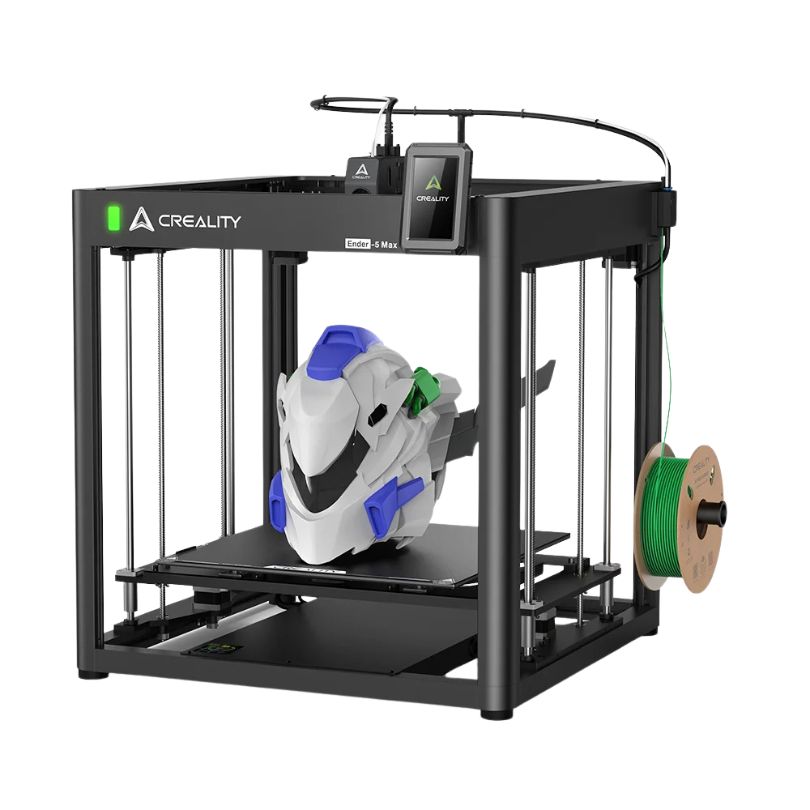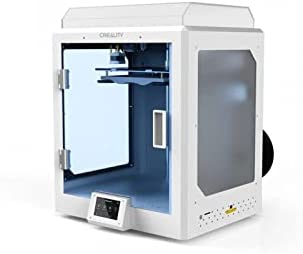Compare Ender 5 Max vs CR5 PRO H
Comparison between the best 3D printers
Choose the best 3D printer at the best price. The cheapest 3D printers are here.
Buy a 3D printer here with 3D Fila.
 |
 |
|
| Model | Ender 5 Max |
CR5 PRO H[BUY CR5 PRO H] |
| Printing Material | Filament | Filament |
| Buy Filament for Creality Ender 5 Max | Buy Filament forCreality 3D CR5 PRO H | |
| Estimated price | $769,00 | $1300,00 |
| Manufacturer | Creality | Creality 3D |
| Release Year | 2025 | 2022 |
| Print Volume [mm] | 400x400x400 | 300x225x380 |
| Printer Size [mm] | 649x721x850 | 530x487x612 |
| Weight [kg] | 25,9 | 32,5 |
| Power Loss Recovery | YES | YES |
| Enclosed printer | NO | YES |
| Bed Leveling | Automatic | Automatic |
| Filament End Sensor | YES | YES |
| Bed type | Heated | Heated |
| Power supply system | Direct Drive | Bowden |
| Standard nozzle | 0,4 | 0,4 |
| Maximum Nozzle Temperature [°C] | 300 | 300 |
| Maximum Bed Temperature [°C] | 100 | 100 |
| Maximum printing speed [mm/s] | 700 | 100 |
| Filament holder | YES | YES |
| Camera for supervision | YES | YES |
| Recommended filaments | Hyper PLA/PLA/PETG/TPU95A/ABS/ASA/PLA-CF/PA/PLA-Silk | PLA, PETG, Tritan, Flex, ABS |
| Recommended slicers | Creality Print 5.1 | Cura, Simplify, Slic3r, IdeaMaker |
| Maximum Resolution [mm] | 0,1 | 0,1 |
| Processor | ATMEGA 2560 | |
| Display | Touchscreen 4,3'' | Display touchscreen 4,3'' |
| Power Supply | 1250 W | 110/220V / 350W |
| Connectivity | USB, Wifi | SD / USB |
| Operating systems | Windows | Windows, Mac, Linux |
| Date of registration in the system | 2025-02-18 | 2022-11-04 |
| Release date | 2025 | 2022 |
| Extra features | The Ender 5 Max by Creality features a 400 x 400 x 400 mm build volume, a rigid aluminum frame, and 36-point auto bed leveling. With speeds up to 700 mm/s, it boasts a hardened dual-gear extruder and a 1000W heated bed, reaching 80°C in just 200 seconds. It supports remote management via WLAN, a tri-color status indicator, and quiet operation, making it ideal for high-precision, high-productivity 3D printing. | The Creality CR-5 PRO H 3D Printer stands out with a high-temperature nozzle (up to 300°C), a 300 x 225 x 380mm print volume, and a closed chamber for thermal stability. It includes BLTouch auto-leveling, a carbon-crystal silica glass base for easy model grip and removal, a filament sensor, and a resume print function. It has a 4.3-inch touchscreen interface, quiet operation, an attractive design, and is pre-assembled, ideal for technical materials. |
| Support for multiple colors and materials (AMS and CFS) | NO | NO |
Notes * |
||
| Cost-benefit | 7 / 10 | 6 / 10 |
| Hardware | 4.5 / 10 | 3 / 10 |
| Tela | . | . |
| Print volume | 4 / 10 | 4 / 10 |
| Performance | 6 / 10 | 1 / 10 |
| [BUY CR5 PRO H] |
Conclusion |
| In comparing the Ender 5 Max and the CR-5 PRO H, several key differences emerge that potential buyers should consider based on their specific 3D printing needs. The Ender 5 Max presents a more economical option with a significantly larger print volume (400x400x400 mm) compared to the CR-5 PRO H's 300x225x380 mm. This increased capacity allows users to tackle larger projects or print multiple smaller items simultaneously. Additionally, the Ender 5 Max boasts a higher maximum printing speed of 700 mm/s, enhancing productivity for those who prioritize quick turnaround times. While both printers offer features such as automatic bed leveling, filament sensors, and touchscreen interfaces, the CR-5 PRO H has the advantage of being an enclosed printer. This enclosure aids in maintaining thermal stability during printing, particularly beneficial when using technical materials that may be sensitive to temperature fluctuations. Furthermore, the CR-5 PRO H supports a high-temperature nozzle, allowing it to work effectively with a wider variety of advanced filaments. In terms of build and weight, the CR-5 PRO H is heavier and offers a robust build quality, potentially contributing to its stability during operation. However, for users who value portability or have limited workspace, the lighter Ender 5 Max might be preferable. Ultimately, the choice between the Ender 5 Max and the CR-5 PRO H should be guided by individual preferences and intended use. The Ender 5 Max is suited for cost-conscious users seeking larger build volumes and faster print speeds, while the CR-5 PRO H caters to those who prioritize capability with specialized materials and the benefits of an enclosed printing environment. Both printers have their strengths and can serve different segments of the 3D printing community effectively. |

